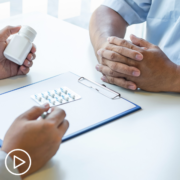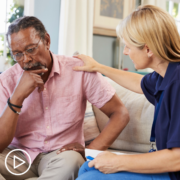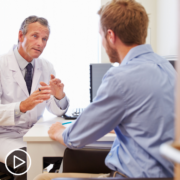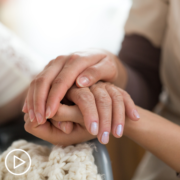Tag Archive for: support group
Expert Advice for Patients With Small Cell Lung Cancer
Expert Advice for Patients With Small Cell Lung Cancer from Patient Empowerment Network on Vimeo.
Dr. Triparna Sen, a leading small cell lung cancer (SCLC) researcher and expert, shares key advice for patients. Dr. Sen stresses the importance of working closely with your doctor, asking about clinical trials options, and the benefits of support groups.
Dr. Triparna Sen is an associate professor in the department of oncological sciences and co-director of the Lung Cancer PDX Platform at the Icahn School of Medicine at Mount Sinai in New York. Learn more about Dr. Sen.
See More from Thrive Small Cell Lung Cancer
Related Resources:

|

Advances in Small Cell Lung Cancer Research | Hope for the Future |

|
Transcript:
Katherine:
What three key pieces of advice would you have for a patient who has just been diagnosed with small cell lung cancer?
Dr. Sen:
First of all, I would like to say definitely, definitely work with your physician. They are trying to do their best for you. Work with your physician. Follow the treatment regimen that they give. Ask about clinical trials that you are eligible for and that you can enroll into. Then, of course, having a support group. So, there are many patient advocacy groups right now for non-small cell and small cell lung cancer.
I think being a part of such a patient advocacy group where you have people going through the same journey, I think, it really helps. It helps you sort of manage your disease better. It helps you stay hopeful when you hear about other people’s sort of prognosis and if they have durable benefits from drugs. So, I think having a support group is very important. If there is an ability for you to contribute to research in terms of giving blood or tissues, if your physician is saying that you could be eligible for that, I think a contribution to research is really key.
Because looking at the disease mechanisms in the clinical tissue is sort of where for us it is absolutely golden. We go there. We look at the disease mechanisms and tissues. If there is an opportunity for you, then I think it should definitely be explored.
Finally, I would like to say we are really trying as researchers to really understand the disease better. We’re trying to do that better. I hope and I pray that we go faster with it. But I think there is hope right now for patients with small cell lung cancer. The research is really progressing better. There are many clinical trials.
So, I think stay hopeful and have a peer support group who can take you through this quite difficult journey.
Katherine:
Why should patients consider consulting with a lung cancer specialist?
Dr. Sen:
I think it’s crucial because these lung cancer specialists really know the current state of the art treatments. They are thought leaders. They participate in trials. They actually sit on advisory boards with companies.
They are strategizing the entire treatment landscape for this disease. So, if you go to a lung cancer specialist, you’re more likely to get the most updated knowledge about what treatments are out there, what you qualify for, what are the clinical trials out there, and what are working in patients. This is not just for small cell. There are many, many trials that are happening in non-small cell also. So, whatever your diagnosis is, a specialist should be able to tell you what your options are. You really want to know about your options. Your options about biomarker testing.
Your options about screening. Your options about trials. I think a lung cancer specialist can really guide you towards that.
Katherine:
Dr. Sen, thank you so much for joining us today. It’s been a pleasure speaking with you.
Dr. Sen:
Thank you.
How Can I Manage Anxiety After Follicular Lymphoma Diagnosis?
How Can I Manage Anxiety After Follicular Lymphoma Diagnosis? from Patient Empowerment Network on Vimeo.
How can follicular lymphoma patients manage anxiety after diagnosis? Cancer patient Lisa Hatfield and expert Dr. Tycel Phillips from City of Hope discuss the experience of watch and wait and advice for coping with anxiety and being proactive in your care.
See More from START HERE Follicular Lymphoma
Related Resources:

|

|

|
Transcript:
Dr. Tycel Philllips:
It’s really about some patients are very uncomfortable being watched with an active cancer. And so, in that situation, that’s probably the biggest discrepancy we have nowadays. Because of the anxiety of the watch and wait approach. Some patients would like treatment right away, irrespective of whether they need it or not. So, you’ll sometimes get discrepancies with our patients about that.
Lisa Hatfield:
The clip you just heard was Dr. Tycel Phillips from the University of Michigan Rogel Cancer Center, who explained how if follicular lymphoma patients are feeling anxious about being in the watch and wait period (aka not starting treatment), they may go seek a second opinion, which is perfectly fine and even encouraged by physicians.
However, even during the watch and wait period, there are still things you can do to improve your health and well-being. Taking control of what you can control may help you feel less anxious. Here are some tips:
- Learn as much as you can about your diagnosis. Know the signs or symptoms that may mean it’s time to start treatment and stay up to date about the latest treatment advancements.
- Establish a relationship with a hematologist-oncologist specializing in your diagnosis. Proactively becoming a patient under their care ensures that, if treatment becomes necessary, you’ll already have a healthcare professional familiar with your case andis updated on the newest available treatments. This specialist does not need to be the same doctor overseeing you in watch and watch.
- Attend all doctor appointments, even if you are feeling well. Some patients may stay stable for years before symptoms or disease progression makes treatment necessary. If you notice changes at any time, don’t wait to reach out to your healthcare team.
- Maintain health insurance coverage, if at all possible. If you do need to begin treatment, you will need health insurance to help cover the cost. Even during watch and wait, regular appointments and testing can add up without health insurance coverage.
- Improve your overall well-being with nutrition, exercise, and other good health practices, such as not smoking and moderating your alcohol intake. This approach positions you to tolerate treatment more effectively when the time comes, minimizing the risk of serious treatment complications.
- Prioritize your mental health. Consider joining a support group or talk with a fellow watch and wait patient to help you work through your feelings and answer questions. If feelings of anxiety or depression begin to interfere with your daily activities, ask your healthcare team for a referral to a mental health professional.
These tips can be useful to you during the watch and wait period as they allow you to keep moving forward and be proactive!
Sources:
- https://powerfulpatients.org/2022/03/01/follicular-lymphoma-treatment-decisions-whats-right-for-you/
- https://www.lls.org/treatment/types-treatment/watch-and-wait
Share Your Feedback:
The Role of a Myeloma Specialist on Your Care Team
The Role of a Myeloma Specialist on Your Care Team from Patient Empowerment Network on Vimeo.
Why should you seek a consultation with a myeloma expert? Dr. Krina Patel discusses the important roles a specialist can play in your myeloma care, even from a distance.
Dr. Krina Patel is an Associate Professor in the Department of Lymphoma/Myeloma at The University of Texas MD Anderson Cancer Center in Houston, Texas. Dr. Patel is involved in research and cares for patients with multiple myeloma. Learn more about Dr. Patel, here.
Related Resources:

|

|

|
Transcript:
Katherine:
You mentioned the healthcare team. Dr. Patel. How does a myeloma specialist fit into that care team?
Dr. Patel:
So, I will say, as a myeloma specialist, I probably have three different ways that I am involved in different patient’s care. So, I have patients who are from Houston, where I’m at, that come to MD Anderson for their treatment. So, I see them on a regular basis if they’re on treatment, or I’m following them to make sure their disease is stable, what’s going on. So, I see them regularly, and I’m their main doctor for their cancer. And then, I have patients who are maybe a little bit farther away, and I see them as part of the team.
So, they have their own oncologist in their community that they’re seeing and they come see me either virtually or in person every few months, or if something’s happening; if their myeloma’s returning or they’re having toxicity, then they reach out to me so I can talk about different ways we can change therapy. And then, the third really is for second opinions where patients don’t necessarily want to come see me all the time but they might want to be on a clinical trial that we might have at MD Anderson. So, they come just for that trial and then they go back to their doctors again. So, we sort of do whatever works best for the patient.
Expert Advice for Newly Diagnosed Myeloma Patients
Expert Advice for Newly Diagnosed Myeloma Patients from Patient Empowerment Network on Vimeo.
Myeloma expert and researcher Dr. Krina Patel shares key advice for patients newly diagnosed with myeloma, encouraging patients to take an active role in their care.
Dr. Krina Patel is an Associate Professor in the Department of Lymphoma/Myeloma at The University of Texas MD Anderson Cancer Center in Houston, Texas. Dr. Patel is involved in research and cares for patients with multiple myeloma. Learn more about Dr. Patel, here.
Related Resources:

|

|

|
Transcript:
Katherine:
Myeloma can be a complex diagnosis. What are three key pieces of advice for patients who has just been diagnosed with myeloma?
Dr. Patel:
I think any diagnosis of cancer, of course, is really hard, but multiple myeloma is so rare in the sense that people don’t know about it; that sometimes it’s the first time they’ve heard of it, when they’re diagnosed. And so, I think the biggest thing about more rare diseases in general, the best advice I could give is getting a myeloma specialist as part of your team. That doesn’t mean they have to treat you, but having them as part of your team. And we can talk about that in more detail. But the second part is really learning as much as you can and not necessarily all on the Internet.
Not everything on the Internet is correct. But really asking questions to your doctors, your nurse practitioners, your nurses, they all have different perspectives that asking questions for all of them is really worthwhile to kind of understand what you’re going through and what’s to be expected. And then, the last piece. I think with multiple myeloma patients, there are so many amazing patient support systems, especially after COVID but even before COVID, in terms of different groups that are sponsored by patients where you can listen when people come to give talks, et cetera. I think those are all phenomenal resources for patients.
Katherine:
What do you think the role is of the patient in their own care?
Dr. Patel:
So, gone are the days of paternalistic medicine, especially in the U.S. My job is not to tell you what to do, but my job is to really give you options as to what is the best possible therapy for you at that time. And really, your job is, as a patient, to make sure that they tell me all the information that’s important for them. So, for instance, if they can’t come to chemo every week because they just don’t have a ride or they have some other medical problems that maybe I didn’t know about, those types of things. We just have to have that open communication, so we can come to that best next therapy together with those decisions.
Peer-to-Peer Advice for Newly Diagnosed Myeloma Patients
Peer-to-Peer Advice for Newly Diagnosed Myeloma Patients from Patient Empowerment Network on Vimeo.
Myeloma Network Manager Honora and Myeloma patient Barry stress the importance of finding a myeloma specialist as soon as possible, finding a support group, being comfortable with your healthcare team. Remaining hopeful and positive throughout your diagnosis is key.
Transcript:
Honora Miller
I’d like to point out the importance of finding a myeloma specialist as soon as possible in your myeloma journey. There have been studies done, I can’t point to the specifics of one at this moment, there have been studies done that have shown that myeloma patients who have a myeloma specialist have a better long-term outcome. When you get a myeloma specialist, they’re dealing, they’ve dealt with hundreds, perhaps thousands of myeloma patients, and because of the complexity and variation of the myeloma with the disease, really you need to have that level of knowledge. So that would be something that I would encourage somebody newly diagnosed to find, to be referred to a myeloma specialist, possibly not as their primary provider, but as a secondary guider of the process. I do have that. So, I have a second doctor who I meet with quarterly, say, who is at a different institution who guides my myeloma treatment, and he’s a myeloma specialist and he handled my stem cell transplant.
Barry Marcus
I think it’s very important to have a support group. Somebody who is newly diagnosed, I would counsel them to seek out a support group now it’s hard in the time of COVID, the support group that I was in, quit meeting because of it. I’m right now in the process of trying to find another one that meets virtually, and I would highly recommend that it feels good to connect with people who are going through the same things that you are, and maybe get varied perspectives on different issues around myeloma.
I really want to emphasize how important it is to get information and to feel comfortable with your health team and the care that you’re getting and pursue that. Don’t feel like you’re worried about offending anybody, because in the first place, probably you’re not. In the second place, it’s your life. If you die, they go on to the next patient. And you’re done.
Honora Miller
True enough. True enough. For new patients, and I’ve talked to quite a few, having hope is something that is very important and having a positive outlook, and when you get this sudden diagnosis, it’s very scary and overwhelming. But I want to encourage people to remain hopeful, to stay positive, this is an as yet incurable cancer, but it’s being treated more and more like a chronic disease, and there’s never been a time as good as now in terms of the number of treatment options and new drugs that are coming down the pipeline, so it’s a time of great hope for myeloma, and I want to emphasize that for people because I do think that it’s important for people to hold on to that.
Barry Marcus
I couldn’t agree more. That’s well said.
Newly Diagnosed with Prostate Cancer? Consider These Key Steps
Newly Diagnosed with Prostate Cancer? Consider These Key Steps from Patient Empowerment Network on Vimeo.
For those who are newly diagnosed with prostate cancer, figuring out what to do next can be overwhelming. Prostate cancer survivor Jim Schraidt outlines advice for patients to encourage self-advocacy and to access resources and support.
Jim Schraidt is a prostate cancer survivor and Chairman of the Board of Directors for Us TOO International. Learn more about Jim Schraidt here.
Related Resources

How Does Us TOO International Support Prostate Cancer Patients and Their Loved Ones? |

How Could You Benefit from Joining a Prostate Cancer Support Group? |

|
Transcript:
Jim Schraidt:
If you’re newly diagnosed, get a second opinion on your biopsy slides. Because reading those slides is as much an art as it is a science. And we’ve had people who will come to our support groups who then went on to have their slides reviewed on a secondary basis. And it’s changed their diagnosis. In one case, a guy discovered that he actually did not have prostate cancer.
And in other cases, it’s changed the grading of the cancer that’s identified in the biopsy, which of course then impacts treatment decisions, whether it’s active surveillance, surgery, radiation, or systemic therapy. So, that would be the first thing. I think the other thing, and I that think this is true for most medical issues, is to get a second opinion, take the time to get a second opinion.
And in the case of prostate cancer, try to do it at a medical center that takes a multi-disciplinary approach to the disease. So, you would be meeting at the outset with a urologist, a radiation specialist, and perhaps a medical oncologist who can really take you through the options, the treatment options for your situation.
And then I guess the final of three items that I would say is find a support group. And even if you want to just join one of the virtual groups and listen and learn, that’s perfectly fine. But learn about the disease you have, and learn about the treatment options, and learn the things that you need to ask your medical practitioners to help you get the best outcome.
Because the happy patient is going to be the one that knows what he’s getting into and makes and accepts that as part of his decision and can focus after treatment on healing and not on treatment regret.
Caregiver Support: Taking Care of YOU
Caregiver Support: Taking Care of YOU from Patient Empowerment Network on Vimeo.
Prostate cancer caregivers support patients in many ways, but also need support for themselves. Social worker Linda Mathew details the role of caregivers and shares resources to help them maintain their own self-care.
Linda Mathew is a Senior Clinical Social Worker at Memorial Sloan Kettering Cancer Center. Learn more here.
See more from The Pro-Active Prostate Cancer Patient Toolkit
Related Resources

|

|

|
Transcript:
Linda Mathew:
So, caregivers have a really important role in caring for their loved ones, so whether it’s their spouse, or a sibling, or a child, they – their role 1). Is to advocate as well for the patient in terms of saying, “Hey, you know what? Let me call the doctor’s office. This side effect was on the list, but I’ve noticed that it’s ongoing, so let me reach out to the office for you if you’re not feeling well.”
They are the eyes and ears for their patient or for their loved one in terms of just saying, “Something is not right. Let me call.” And, most of our nurse practitioners or nurse office practice nurses will say to the caregiver, “You are our eyes and ears when you’re at home. When the patient is here, we’re the eyes and ears for that person to assess what’s going on.”
But also, the caregiver really – sometimes, what happens is there’s a role reversal, so they become that emotional support for the loved one, the financial support, practical support, and also the spiritual support for their loved one, and we remind them that is your – that is a huge role to play, and there’s no handbook for it, but we have resources for you, so you’re not alone in that process.
And, the one thing we really stress is here at Memorial Sloan Kettering Cancer Center, we recognize the important role of our caregivers and how important they are to the loved one that they’re caring for. So, with that resource-wise, the social work department has a program called Reach for Caregivers, and it’s a hospital-wide program that we offer support groups as well as educational workshops.
And then, in November, being Caregiver Month, we put on a lot of different programs just for our caregivers to know we recognize you, we know you need the support, so here it is. So, in terms of support groups we offer, it’s all online because we know that sometimes, the caregiver is also working outside of the home, so to help meet them where they are, we’ve offered an online support group that they can tap into during their lunch hour, or even after work.
Why You Should Speak Up About Your Prostate Cancer Care
Why You Should Speak Up About Your Prostate Cancer Care from Patient Empowerment Network on Vimeo.
What are the benefits of prostate cancer patients speaking up about their care? Linda Mathew discusses the impact of patients taking an active role in their care.
Linda Mathew is a Senior Clinical Social Worker at Memorial Sloan Kettering Cancer Center. Learn more here.
See more from The Pro-Active Prostate Cancer Patient Toolkit
Related Resources

|

|

|
Transcript:
Linda Mathew:
Our medical team is really open about having discussions. So, 1). Our team is not blind to knowing that our patients may want a second opinion just to validate “Hey, is this – do I have all of the information laid out in front of me?”, and we always say it’s like – it’s always good to have that second opinion just to say, “Ah, what’s been told to me is correct, and it goes in line with what I’m reading on the different websites for these places that I’m going to for possible treatment.”
I always tell our patients also that you are your best advocate, so you know what your needs are, and if it means that you need more information before you make a final decision, then do it.
So, if it means talking to other people or going for a second opinion, then go ahead and do that, but I also tell our patients if you’re scared about asking a question, if you’re not – that’s a huge issue. If you’re scared to ask a question to your medical team, that means that, in itself, says, “Hey, is this the right fit?” So, I always encourage our patients, “Our team knows that you want to ask a question. Just go ahead and ask it. You’re not going to embarrass them; you’re not going to embarrass yourself. That’s what your physician and the nurse are there for.”
I think the one thing I would want to stress is that you, the patient, knows themselves. They know what their needs are more so than anybody else, so if that means that you feel like something is missing, then speak up, let us know, and if you don’t feel saying it to the nurse at the moment when you’re in a visit, you can always reach out to the social worker, who can help direct that question back to the team or help you find a way to ask that question either via the portal or an email to the medical team.
Tools for Managing Prostate Cancer Fear and Anxiety
Tools for Managing Prostate Cancer Fear and Anxiety from Patient Empowerment Network on Vimeo.
Fear and anxiety are common feelings that arise while living with prostate cancer. Social worker Linda Mathew explains how she helps patients improve quality of life while living with prostate cancer.
Linda Mathew is a Senior Clinical Social Worker at Memorial Sloan Kettering Cancer Center. Learn more here.
See more from The Pro-Active Prostate Cancer Patient Toolkit
Related Resources

|

|

|
Transcript:
Linda Mathew:
The common fears and worries that they have are – form the support group itself, the main ones that we always hear are the incontinence and erectile dysfunction. So, we really focus on what that means for them as men because it is their manhood, and their biggest concern is “No one told me I was going to have incontinence for this long. I thought it was going to end after a couple months of recuperation from surgery.”
And, we remind them your body has just gone through a shock in terms of having a prostatectomy, and so, it’s your body having to realign and remember what to do again in terms of taking care of itself. Just the same way as in erectile dysfunction, that is possible after having a prostate surgery – prostatectomy, so we remind them there are resources we have here to help address sexual health. So, I am obviously going to refer our patients to our men’s sexual health clinic, which is run by Dr. Mulhall and his team. So, those are the two areas that they really bring up, and it’s also in terms of “Can I have a relationship?” if they’re single, or “How do I let my significant other know that I’m having these issues?”
And, I always – I’m always encouraging our patients “Let’s talk about how to have that conversation if you’re scared of having it. What does that look like for you? What do you think is the worst thing that would be said to you? Let’s approach it from that end in terms of saying here’s some tools for you to have that discussion with your significant other.”
I start off with validating their feelings. I think that’s really important for our male population, is just that it’s okay to feel anxious, and anxiety is real, and with this population, PSA anxiety is very real. So, it’s going in for those three-month checkups to say, “How is my PSA doing? Am I in the right track?”, and just giving them that validation like, “It’s normal. What you’re feeling is normal.”
It relieves a lot of their anxiety because then, they’re thinking, “Okay, I’m not the crazy one here. Yes, what I’m going through – this uncertain journey that I’m on – everyone’s feeling this, no matter what the diagnosis is.” And then, I just – we talk about what it means for them, like what does this cancer diagnosis mean for them. Most of our men are always like – they want something that can be like there’s a solution-oriented process to it, and there’s no solution-oriented process to this, so it’s about how do you sit in that ambiguity, that uncertainty of this journey, and what can you do for yourself that you feel like you’re in control of?
So, for our prostate cancer patients, knowing that there are other people out there that they can talk to is a relief for them, that they’re able to know that there might be a group of men who can say, “Hey, I was there right where you were when I was initially diagnosed in terms of anxiety, in terms of not knowing how to make a decision about treatment plans or treatment options, but maybe my two cents can help you.”
A lot of patients that come to my support group, which is through the Resources for Life After Cancer program, really find that connection helpful because you’ve been given so much information, and you’re feeling overwhelmed by “How do I make this choice – a good choice – for myself?”, connecting with other men who’ve been given the same options, and made a decision, and see where they are now in treatment helps release – decrease the anxiety, but also gives them some relief in terms of not feeling like there’s pressure to how to choose the right answer, or the right recommendation, or the right treatment plan.
How Can a Prostate Cancer Social Worker Help You?
How Can a Prostate Cancer Social Worker Help You? from Patient Empowerment Network on Vimeo.
How can a prostate cancer social worker help patients and their families? Linda Mathew, a senior social worker, shares how she provides support for patients and their loved ones after diagnosis, during treatment, and beyond.
Linda Mathew is a Senior Clinical Social Worker at Memorial Sloan Kettering Cancer Center. Learn more here.
See more from The Pro-Active Prostate Cancer Patient Toolkit
Related Resources

|

|

|
Transcript:
Linda Mathew:
Hi, I’m Linda Mathew, and I am a senior social worker here at MSK. I am a supervisor in the Department of Social Work, but I also have a service, and I work with the urology service, so, both medicine and surgical patients.
And, really, it’s just – I’m here as clinical support to our patients in terms of individual counseling, couples counseling, family counseling.
So, what we really do is we provide supportive counseling to our patients. So, in terms of when we say “supportive counseling,” if patients are anxious, or have some depression around the diagnosis, or have just fears around what that – what it means to have a cancer diagnosis and the uncertainty about what that journey will look like, they are referred to me to just process that out loud in terms of questions about themselves and how – how are they going to manage a diagnosis if they’re going to be on chemotherapy or questions about how to support their family around this diagnosis if they don’t even know how to have this conversation with their family.
Most times, if it’s a couple that come in, it’s around how do I support the patient as well as the caregiver through the trajectory of this patient’s treatment. So, the patient is dealing with their own diagnosis and treatment and what all that means, and the caregiver is also having a parallel process with this where they are caring for the loved one, but also have their own fears about “How do I navigate being a support to them? I don’t know what it means to be a caregiver for somebody who’s going through medical treatment.”
So, we help slow that down for them and say, “These are the things that you need to look out for. Just – you are their extra advocate. You are that person – their eyes, their ears – when they are not able to call the doctor’s office to be able to say, ‘I can call the doctor’s office with this information. Just tell me what you want me to say.’”
But, you’re also just there as a support, so it’s a really weird kind of…reminding our patients the tools that they already have, but because they feel like they’re in a crisis, they forget what those tools are.
Please don’t feel like you have to figure this out on your own. Your medical team is here for you, social work is here for you, we have an ancillary service – like, services available in terms of the men’s sexual health clinic integrated medicine counseling venture, all in terms of supporting our patients. So, when in doubt – and, if you don’t know who to turn to, just turn to your social worker and ask them. Say, “I need help,” and we’ll guide you through it.



